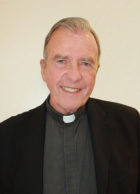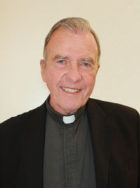John Haught’s vision of evolution calls us to deepen our view of evolution and to see it as a drama that has been happening for billions of years. I find this view of evolution both awesome and exciting.


John Haught’s vision of evolution calls us to deepen our view of evolution and to see it as a drama that has been happening for billions of years. I find this view of evolution both awesome and exciting.

In his insightful and provocative book “Making Sense of Evolution: Darwin, God, and the Drama of Life” (Louisville, Kentucky: Westminster John Knox Press, pp. 163) John Haught argues that if evolution is studied over the billions of years that it has been taking place, what can be discerned is that there is a narrative or story to evolution.

I am amazed that even today many people believe that science and theology contradict one another. I am also amazed at the number of people who believe that to know some reality in the best and most profound way is to know it scientifically. To know a reality scientifically is wonderful but it is also wonderful to know a reality philosophically, theologically, or poetically.

For much of my life I thought I lived in a kind of a “two level universe.” There was the supernatural world and there was the natural world. They were separate. For me the supernatural world included the Eucharist and the other sacraments, sanctifying and actual grace, heaven, hell, purgatory, the bible and other “spiritual books.”

One of the most encouraging truths of Christian faith is that God is providential. We are never alone. God accompanies us on every step that we take. I find the truth that God is providential, that God is leading history and each one of us to a deeper relationship with God, is one of the most consoling Christian doctrines but also one of the most mysterious.

During the pandemic I have frequently looked through my bookcase. Finding Cooke’s book, which I had not looked at from the time I first read it, probably 40 years ago, seemed like a special grace. It was like meeting an old friend.

As I was reflecting on how to end this series of columns in which I have tried to use the novels and essays of Walker Percy (1916-1990) to provoke thought about the mystery of the human person, I spotted in my bookcase a book that I had read and enjoyed many years ago. It was Ralph McInerny’s “Some Catholic Writers” (St. Augustine’s Press, 2007).

Writing this series of columns, using insights from Catholic, existentialist novelist Walker Percy (1916-1990), has been an exceptionally pleasing experience for me.

Besides scientism, another subject, perhaps the subject that Percy deals with more than any other is the mystery of the human person. In his six novels and his books of essays, Percy focuses on what it means to be a human person, what it means to be an image of God. Right now I cannot think of a more important topic.

The experience of the pandemic is an experience that we should never forget and pray that we never have again. Probably for each of us, the experience has been in some way a learning experience. It probably forced all of us to reflect deeply on our lives and our relationships. I have come to believe that all of us are a product of our relationships — our relationships with God and with others.